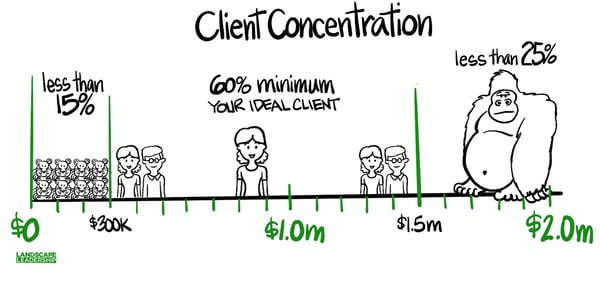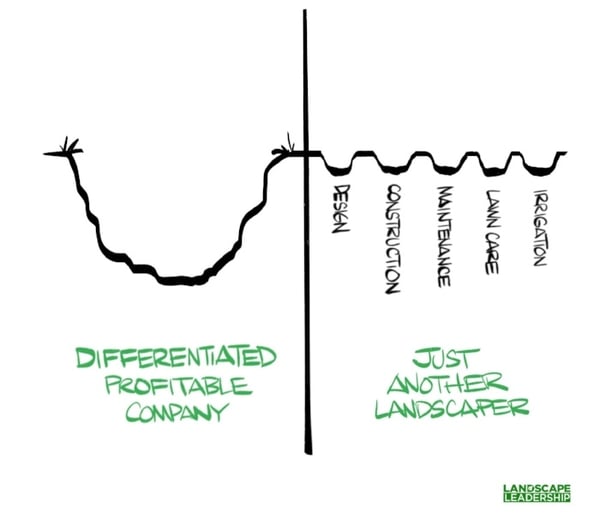Topics: Branding And Positioning
When Positioning Can Go Wrong (or, The Challenges You'll Face Serving a Niche)
 Author: Chris Heiler
Author: Chris Heiler
I've written an awful lot about the principles of positioning on this blog over the years. That's because I want you to be different from every other landscaper or lawn care operator out there. I want you to be in demand and make the money you deserve for working your asses off.
Creating a unique identity and carving out a position in the marketplace (and your prospects' minds) isn't easy. In fact, it takes a lot of courage and sacrifice, which is why most companies don't go down this road and instead settle for being Just Another Landscaper.
To briefly recap previous articles, "positioning" is how you differentiate your company from your competitors in the mind of your prospects and customers. This differentiation brings many benefits, including:
- It's easier to find your clients (when you aren't busy trying to attract everyone)
- Word about you and your services spreads faster
- You can charge higher prices (i.e- more profitable)
- You are more immune to economic downturns
- Attracting and hiring quality employees is easier
Not to brush aside these benefits, but there are challenges related to positioning that we need to discuss. In other words, when positioning can go wrong.
There are three primary pitfalls you need to dodge:
- Having an unhealthy dependency on a specific industry or market segment
- Your expertise or specialization is so narrow that your market cannot support you
- Maintaining your leadership position in the marketplace over the long haul
Let's tackle one at a time...
Pitfall #1: Having an unhealthy dependency on a specific industry or market segment
The key word here is "unhealthy". I'm thinking of a company (fictitious) like ABC Landscaping who derives 100% of its revenue by providing landscape installation services for two or three large tract home builders. Nice niche... but dangerously narrow.
Having a small number of "gorilla clients" like this feeding you work during a booming economy can obviously boost your top line revenues. However, a dependency on large clients like this can backfire during a recession. Read more about "client concentration" issues and about our recommendations here.

When you operate in a narrow niche like this you are also tied to the ebbs and flows of the niche's micro-economy. It was for this reason I was a bit worried at the beginning of this Covid pandemic. Lucky for Landscape Leadership – who only works with companies in the lawn and landscape industry – most of you were deemed essential businesses.
Pitfall #2: Your expertise or specialization is so narrow that your market cannot support you
Another pitfall to be aware of is attempting to go too narrow with your positioning. Some markets simply won't be able to support your expertise or specialization due to size, population, incomes, etc.
For instance, if your expertise is "organic lawn care for homeowners", you better be located in a market with the population and demographics to support this positioning. If you are, you stand to make a lot of money as the market leader in organic lawn care. If not, you'll have major problems. This is fundamental supply and demand principles at work.
Another problem related to this pitfall is that some companies are simply ahead of their time as it relates to their expertise. A few years ago, on this blog, I wrote about the difficulties a business could have positioning their company around the concept of "sustainability". It's a word that can be misunderstood by consumers, which can make adoption difficult.
Remember the Segway, the two-wheeled self-balancing "human transporter" introduced in 2001? How about Google Glass, a brand of "smart glasses"? Both products were launched ahead of their time and struggled to gain adoption. This can happen with expertise just as it does with consumer products.
Pitfall #3: Maintaining your leadership position in the marketplace over the long haul
Maybe you were first to market with your big idea and quickly staked out your position as the leader in your prospects' minds. Kudos to you.
"First to market" is extremely important. It provides a huge advantage and head start. That said, competitors will notice and they won't be far behind.
I see this principal play out first hand with Landscape Leadership and our competitors. I know people watch what we're doing and try to model it in some way or fashion. That's okay. As the leader we're challenged to maintain our leadership position in our space.
Your team can also chip away at your market leadership position from within. This can be far more dangerous than what your competitors can do.
If your competitors are copying you then at least they are building more awareness in the marketplace (i.e.- a bigger pie) around your services or niche.
Your employees can erode your position by steering you, the owner, off course. Sadly, this is often what happens. In the beginning you're known for high-end, luxury design/build work but overtime you're pushed by employees to add other offerings. Next thing you know you're "full service", have no identity, and lost your market leadership. You have a lot more employees but thinner profit margins.
As the leader in your market, over time, you need to build "depth" in the products and services you offer. Read this article to go deeper into that concept. It's extremely important, but mostly ignored by companies in the lawn and landscape industry unfortunately.
 The most profitable companies build depth in their service offerings around a core competency as opposed to digging many "shallow holes" by offering semi-related services.
The most profitable companies build depth in their service offerings around a core competency as opposed to digging many "shallow holes" by offering semi-related services.
---
Let's recap...
First, be careful not to be too overdependent on a single industry or market segment. Second, don't go too narrow with your niche/positioning if your market won't support it.
Lastly, if you are successful at positioning your company as a market leader, you need to do everything in your power to protect that position. And, like I said, protecting it from within will be more important than worrying about what your competitors are doing.
None of these pitfalls or challenges are a reason to continue on your current path as Just Another Landscaper, being all things to all people. Differentiation and building a unique identity for your company is the path to profits.
If you find our insight helpful, please consider subscribing to this blog. We typically share two to three new articles each month with our nearly 5,000 lawn and landscape industry subscribers. Just add your email address in the form below.




